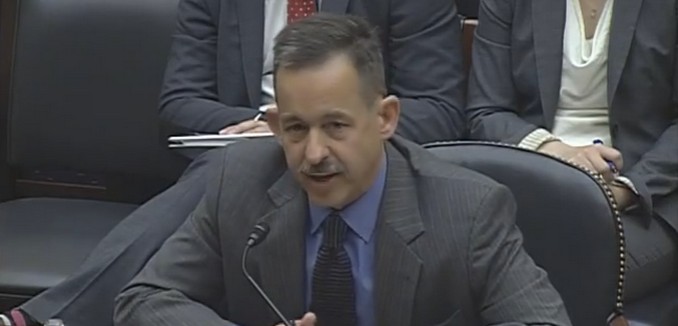The United States has not sanctioned any Iranians for human rights abuses since last year’s nuclear deal with Iran was signed, a senior Obama administration official told the House Foreign Affairs Committee Wednesday.
“There has not been a specific sanction on human rights cases since the signing” of the nuclear agreement, admitted Ambassador Stephen Mull, the official in charge of overseeing implementation of the nuclear deal.
Rep. David Cicilline (D-R.I.), who supported the nuclear deal but has expressed his concern that human rights abuses have increased in Iran since that time, said he was disappointed in Mull’s response. “We were told during this process that getting the nuclear issue off the table was so critical and we could actually expect Iran to engage in additional destabilizing activity,” he said. “We were assured that this would give us an opportunity to push back hard in these other areas because the danger of a nuclear Iran would be off the table, and I was very persuaded by that.”
International concern has grown in the past year over Iran’s deteriorating human rights protections. In the most recent incident to garner international attention, leading Iranian human rights activist Narges Mohammadi was sentenced to 16 years in prison on Tuesday for establishing an anti-death penalty group. Her conviction led to criticism from the United Nations High Commissioner for Human Rights. Mohammed’s arrest last year came a week after Iranian Foreign Minister Mohammad Javad Zarif said that Iran doesn’t jail people due to their political opinions.
“Congress wants to impose new pressure against Iranian human rights violations, but the Obama administration keeps blocking new action. The administration’s excuse is they already have all the tools they need,” a source who works closely with Congress on Iranian issues told the Washington Free Beacon. “What today’s admission shows is that they might have those tools, but they’re certainly not using them.”
Secretary of State John Kerry said in a Senate hearing last September that Iran understood that imposing new non-nuclear sanctions was possible.
We’re not going to come back and just slap [sanctions] on again, but that absolutely does not mean that we are precluded from sanctioning Iranian actors, sectors, as any actions or circumstances warrant. So all of our other sanctions authorities remain in place, they are unaffected by this agreement, and Iran only said, if you read what it says, that they would treat the imposition of new nuclear-related sanctions as the grounds to cease performing. But they are clear, and we are clear, that we have all other kinds of authorities.
The Obama administration has been working hard to ensure that Iran can’t accuse it of failing to live up to its obligations under the nuclear deal. In response to Iranian complaints that the U.S. hadn’t made unfrozen assets sufficiently available for international investment, Kerry went to Europe earlier this month to encourage banks to do business with Tehran. His efforts met with resistance, however, because the sanctions and anti-banking orders that were created because of Iran’s history of terror financing remain in place. Stuart Levey, a former U.S. Treasury Department official who is now the chief legal officer for the banking giant HSBC, wrote in The Wall Street Journal earlier this month that his institution “has no intention of doing any new business involving Iran” because of the serious concerns over “financial-crime risks and the underlying conduct” of Iran.
A number of experts predicted that repression and destabilizing behavior in Iran would likely increase as a result of the nuclear deal. Benjamin Weinthal, a research analyst at the Foundation for Defense of Democracies, wrote last July that lifting nuclear-related sanctions could empower the Iranian government to crack down on its citizens. The Washington Post‘s Jackson Diehl observed that the most likely outcome of the Obama administration’s engagement with Iran seemed “is not the implosion of the Islamic republic, but its perpetuation.”
[Photo: House Foreign Affairs Committee / YouTube ]




